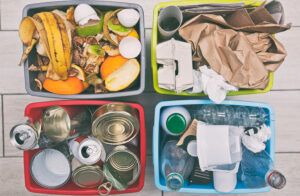
Waste is fast becoming one of the most publicised and talked about problems, with retailers, business and individuals putting into place a range of different measures to tackle this waste consumption – this often starts with segregation. Where some of these changes have made a positive impact on reducing waste and helping the environment, in reality many other alternatives are actually causing just as much if not more harm. For instance, reducing the packaging on food waste, may reduce the (tiny bit of) plastic waste – however, with this packaging, you are vastly reducing the shelf life of this product thus producing much more food waste. Similarly, switching from plastic bags to alternatives like paper and particularly cotton tote bags have a much greater environmental impact and have to be used a lot more times to be as environmentally friendly as a plastic carrier.
Excessive Waste
But it is not just these consumer / retail changes that are harming the environment, even more wrongfully the majority of this excessive waste is caused by us, the general public. The litter that is polluting our oceans is a serious and upsetting reality. Research has shown that if we do nothing about the marine pollution, by 2050 there will be more plastic in the ocean than fish. But how did this get here? Sadly much of this pollution was man-made by littering. Intentional or accidental, litter is a world wide issue, one that sadly ends up affecting our oceans and rivers and well as animals and marine life. Litter left on the beach after a day in the sunshine and sand will get dragged out to sea when the tide retreats. If not left to pollute the water, it is mistakenly consumed by sea-life, who often sadly lose their lives afterwards. This is why it is not only important but VITAL that you take all your litter home, or dispose of it in a near by bin (a recycling bin is even better). A good tip would be to take a re-usable bag with you when you are on the go, this way you can collect you rubbish as you go and place it in the bag, you can then dispose of it correctly when you return home. Littering should never be an option!
Littering isn’t the only issue however, sometimes even recycling can cause waste! Yes you heard that right, recycling can cause waste… when done incorrectly. Recycling is an excellent way to help save the planet, however this is hindered when the recycling gets contaminated. Often people do not pay close enough attention to the recycling labels and instructions, instead they simply put it straight into the recycling, however there are many items that should NOT go into the recycling, for example polystyrene. If this is place in the plastic recycling bin , it contaminates the rest of the waste in there, and that then becomes obsolete. Another form of cross-contamination is not washing or rinsing the items out before recycling them. From yoghurt pots to pizza boxes, it is vital that we ensure we are only putting clean containers in the recycling bin, one dirty plastic tub can leak and contaminate the entire bin, meaning they can no longer be recycled.
The final point we would like to raise, is the importance of recycling segregation to avoid unnecessary items being sent to landfill, where they can take a shocking and sometimes endless amount of years to decompose. The differing types of wastes, takes differing lengths of time to break down and decompose naturally, sadly due to the tightly compact piles at landfills, this timescale is increased further due to the lack of oxygen helping the items decay. Here is how long a few everyday items take to decompose, when they are not correctly recycled.
Timescale of waste:
- Plastic bottles: 70-450 years
- Tin can: around 50 years
- Leather shoes: 25-40 years
- Nylon clothes: 30-40 years
- Glass bottles: 1,000,000 years
- Fishing line: 600 years.
- Glass bottle; 1-2 million years
- Aluminum can: 200 years
All of the above can easily be recycled in either the kerbside recycling, by re-using them or taking them to charity shops / other 2nd hand stores in the hopes of being re-homed. Recycling doesn’t have to be a difficult task, it is something we all should be doing naturally in order to help save the planet. If you are struggling with recycling, do your research and educate yourself of the recycling schemes in your area and how you can get involved. Segregation is key to stop cross-contamination and learn more about recycling in order to help make this planet a cleaner and greener place to live.